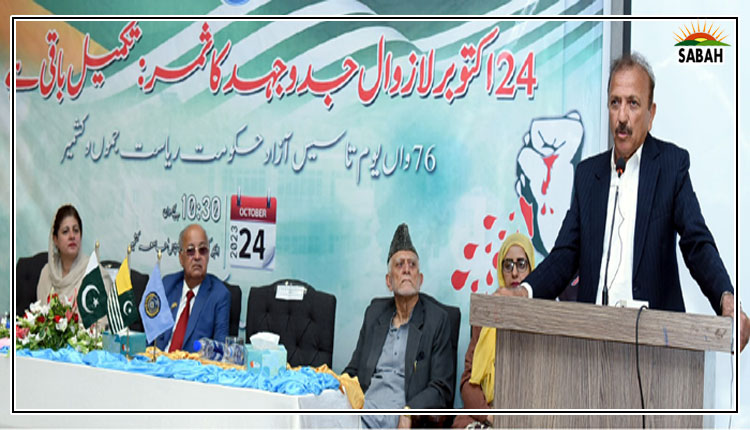Eminent speakers at University of Azad Jammu & Kashmir seminar call for revitalized Kashmiri voices
MUZAFFARABAD, Oct 24 (SABAH): The eminent speakers at a seminar, held in commemoration of the 76th Foundation Day of Azad Jammu and Kashmir call for a renewed approach to take the Kashmir Liberation Movement to its logical conclusion.
The event organized by the University of Azad Jammu and Kashmir was attended by distinguished scholars and speakers, including former Chief Justice Syed Manzoor Hussain Gillani, AJK Minister Dewan Ali Khan Chughtai, Vice Chancellor Prof. Dr. Muhammad Kaleem Abbasi, Chairman of the Right to Self-Determination Movement (International), Raja Nijabat Hussain, Secretary Midhat Shehzad, Chairman District Council Muzaffarabad, Imtiaz Abbasi, Religious Scholar Sahibzadi Mardiya Sultana Faizpuri, Director of KPRI Dr. Raja Sajjad Khan, and Additional Registrar Sardar Zaffar Iqbal. Together, they commemorated the historic establishment of Azad Jammu and Kashmir’s first independent government on October 24, 1947, a watershed moment in the struggle for freedom.
They pays homage to the founders of the remarkable birth of Azad Jammu and Kashmir’s inaugural government, born from the liberation of a substantial five thousand square kilometer area following the arduous armed struggle of 1947.
Former Chief Justice (Retd) Syed Manzoor Hussain Gillani, in his compelling address, shed light on the dire situation in Indian-administered Kashmir, emphasizing the urgent need to bring the humanitarian and legal aspects of the Kashmir issue to the world stage. He called for proactive measures by Pakistan and urged the AJK government, political parties, and the people to secure the region’s freedom while exposing India’s unlawful occupation of Kashmir through constitutional, legal, and political steps. Justice Gillani underscored the importance of strengthening Pakistan’s legitimate relationship with Kashmiris, encompassing Azad Kashmir and Gilgit-Baltistan, and advocated for measures empowering Kashmiris to protect their economic and political rights, ultimately driving the freedom movement towards its logical conclusion.
State Minister Dewan Ali Khan Chughtai, recognizing the enduring nature of the struggle in Occupied Kashmir, implored the government and citizens to collaborate towards the region’s hard-earned goals. He emphasized the broader significance of this liberated territory, not merely in a local context but as a representative government for the entire state of Jammu and Kashmir.
Vice Chancellor Prof. Dr. Muhammad Kaleem Abbasi, during the event, emphasized the pivotal role of October 24th in the Kashmir liberation movement and its enduring importance for the movement’s ultimate success. He drew attention to the historical backdrop, wherein several states, including Hyderabad, Junagadh, and Manavadar, declared their independence following India and Pakistan’s partition in 1947, only to be swiftly annexed by India within a month. Nonetheless, the Kashmir conflict remains unresolved, a testament to the enduring strength of the movement, anchored in its political and geographical base camp. Prof. Dr. Abbasi paid heartfelt tribute to the leaders of the Kashmir Freedom Movement, the valorous freedom fighters who made the ultimate sacrifice, and the dedicated political leaders who have sacrificed significantly in the quest for freedom.
Chairman of the Right to Self-Determination (International), Raja Najabat Hussain, underscored the relentless efforts of Kashmiris residing in Britain, Europe, and other parts of the world. Their endeavors not only aim at securing economic prosperity for themselves and their families but also fervently champion the cause of freedom for the occupied regions of their homeland. Raja Najabat Hussain emphasized the pivotal role played by Kashmiri immigrants in the ongoing struggle, raising their voices in support of Kashmiris in major world capitals, including London, Washington, Brussels, and beyond.
The seminar’s speakers collectively stressed the imperative to reimagine and reinvigorate the Kashmir Liberation Movement, in alignment with the principles established in the government charter of 1947. They called upon the government at the movement’s heartland to assume a prominent role in the ongoing struggle for the freedom of occupied Jammu and Kashmir, both locally and on the global stage. Moreover, they emphasized the significance of harnessing the collective power of two million Kashmiri immigrants, in the age of digital communication, for effective diplomatic and political support of the Kashmiri freedom movement.












